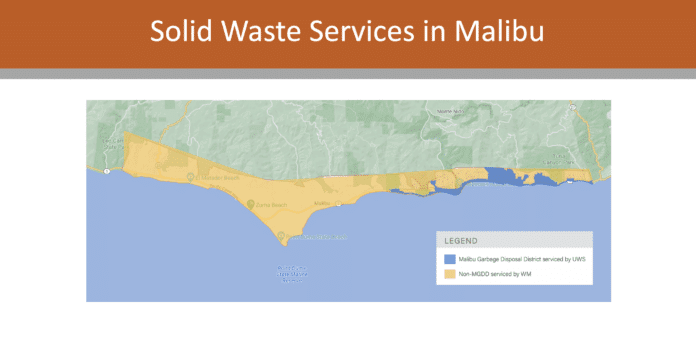
Beginning Jan. 1, a new California law, SB 1383, took effect, requiring businesses and residents to recycle organic food waste. This is in an effort to reduce waste disposal and divert organic waste from landfills, “which eliminates a significant source of methane emissions, one of the most damaging short-lived climate pollutants” according to Coby Skye, a deputy director with Los Angeles County Public Works. Skye oversees solid waste management and other environmental initiatives for the county.
Skye was one of the speakers at a virtual meeting April 28 co-hosted by the City of Malibu to educate residents on the new law, residents’ recycling obligations and just how to do it.
First of all, it’s important to know what organic waste is now mandatory to recycle. All food, food scraps, food soiled paper, landscaping waste, wood, manure, and organic textiles count as organic waste that must now be recycled. Christine Shen from the City of Malibu explained at the presentation that this organic material breaks down in landfills creating methane.
“This is a problem because methane is a greenhouse gas that is 25 times more potent than carbon dioxide,” Shen said. “Reducing this gas now will significantly reduce emissions and the impacts of climate change in our lifetime.”
The next import issue for Malibu residents is to know who your waste hauler is, because the two trash collecting companies in Malibu have different organic waste recycling systems.
Universal Waste Systems services the east end of town to John Tyler Road in what’s known as the Malibu Garbage Disposal District. These customers do not receive a separate monthly trash bill because it is already included in city property taxes. Non-MGDD customers are serviced by Waste Management and do receive regular trash collection bills.
The virtual presentation asked the two different groups to use breakout rooms to learn how to recycle with their different haulers.
It’s very easy for those serviced by UWS. Residents will continue to maintain their three bins: green for yard waste, blue for recycling, and black for trash and organic waste. UWS will take food scraps and other organic waste matter in the black bins to a high diversion processing facility, where food waste will be extracted from the trash and converted into energy.
Residents who use Waste Management for trash collection were directed to separate food scraps from trash and place that in the green waste cart without plastic bags. However, late Friday, a day after the virtual meeting, those residents caught a break with WM officials making recycling one step easier.
WM announced that their facility can now process and remove plastic bags from source separated organic food waste. That means residents can now use plastic bags in their reusable food scrap containers and place those in their green waste carts.
“This will be much easier for residents to move their food waste to the green cart,” Shen explained. “We’ll be updating our materials to reflect that since this was just finalized last night.”
SB 1383 also calls for reducing food waste in general. “This can be done by planning ahead so you don’t buy more than what you need, as well as prepping and storing food in ways that make it last longer,” Shen said.
Learn more at Malibucity.org/homezerowasteguide or Malibucity.org/organics
